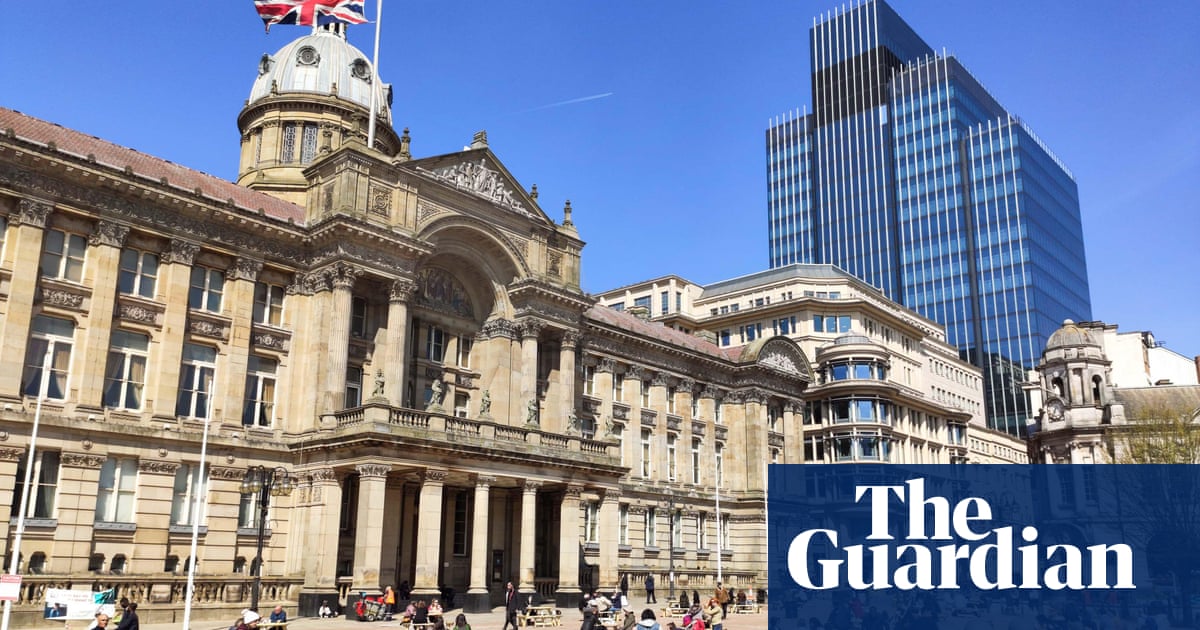
Birmingham city council, the largest local authority in the country, has in effect declared itself bankrupt after issuing a section 114 notice, signalling that it does not have the resources to balance its budget.
The notice, preventing all but essential spending to protect core services, was issued on Tuesday with council leaders blaming a £760m bill for equal pay claims, problems installing a new IT system and £1bn in government cuts over the past decade.
The council said “it does not have the resources” to fund its equal pay liability, and has a gap in its current budget of £87m.
In a statement, the leader and deputy leader of the Labour-run council, John Cotton and Sharon Thompson, said: “Like local authorities across the country, it is clear that Birmingham city council faces unprecedented financial challenges – from huge increases in adult social care demand and dramatic reductions in business rates income, to the impact of rampant inflation, it is clear that local government is facing a perfect storm.”
Downing Street acknowledged that the council declaring itself to be in financial distress would be “concerning” for residents.
The prime minister’s official spokesperson said: “The government for its part has stepped in to provide support, an additional £5.1bn to councils in 23-24, which is more than a 9% increase for Birmingham city council.”
He added that “clearly it’s for locally elected councils to manage their own budgets”, and that the government had expressed concern about “their governance arrangements and has requested assurances from the leader of the council about the best use of taxpayers’ money”.
He acknowledged Birmingham had a “particular issue around equal pay settlements” and said ministers had “commissioned an independent governance review which will report in the coming weeks”.
The council last year published a financial plan described as a “bold budget” designed to “maximise the potential of a golden decade for the city”, ahead of the arrival of the Commonwealth Games that took place in Birmingham last summer.
In a council meeting on Tuesday morning, Robert Alden, the leader of the Conservative opposition, accused the council of “lying to the people of Birmingham”.
“This administration claimed that under Labour Birmingham was facing a golden decade. This was fools’ gold. It is cloud cuckoo land to claim the problems in Birmingham are being replicated across the country,” he said.
A section 114 notice, issued in the past by cash-strapped councils including Croydon and Thurrock, means no new expenditure is permitted, with the exception of protecting vulnerable people and maintaining statutory services.
In June, the council revealed it had paid out £1.1bn in equal pay claims over the past decade, and had a current liability of £650-750m, accruing at a rate of £5m to £14m a month.
Thousands of women employed by the council were granted compensation in 2014 after a successful equal pay claim in which they argued they had missed out on bonuses awarded to men on the same paygrade, with claims stretching back several years.
On top of this, the council leader confirmed earlier this year that problems with a new IT system being rolled out across the council would cost up to £100m to fix.
The council also criticised the fact it had “had £1bn of funding taken away by successive Conservative governments”.
Last week, it was revealed that at least 26 councils in some of Britain’s most deprived areas were at risk of effective bankruptcy within the next two years, according to the Special Interest Group of Municipal Authorities (Sigoma), a collective of 47 urban councils.
The first section 114 notice was issued by Hackney council, in east London, in 2000, with Northamptonshire county council following suit in 2018.
Croydon council issued its third section 114 notice in November 2021, while Thurrock in Essex took the step in December last year after it got into difficulties over borrowing large sums to invest in solar energy.
Woking also issued a section 114 in June due to what it said was “an extremely serious financial shortfall” owing to a £1.2bn budget deficit caused by risky commercial investments.
In July, Birmingham city council commissioned an independent governance review, in collaboration with the Department for Levelling Up, Housing and Communities, to look at its financial issues.
Sources in the council said the financial crisis was a “ticking timebomb that was waiting to go off”, and expressed fears that “some of the poorest people in our country” would suffer.
They also suggested the new council leaders, who were selected by the national Labour party and took charge in May, “had inherited a difficult situation” and were being “open and transparent” about the issues.
Ian Ward led the council for six years until he was ousted earlier this year when the national Labour party intervened after a damning internal report said the local party was “dysfunctional” and dominated by “personality-driven factionalism”.
Richard Parker, Labour’s candidate for West Midlands mayor, said “demand for services and inflation spirals” meant the council was “no longer able to take the strain”.
“This is further evidence of the impact of over a decade of Conservative cuts to essential public services,” he said. “The Labour party has put in place a new leadership team who have my full support and who are working hard to turn around the council and deliver for residents.”
Bagikan Berita Ini















0 Response to "Birmingham city council declares itself in financial distress - The Guardian"
Post a Comment